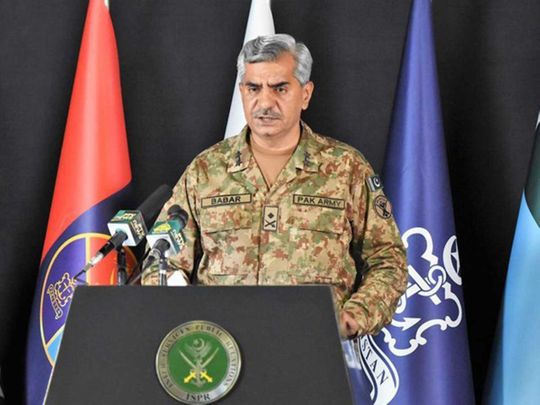
Islamabad: Recounting the achievements of the anti-terror operation, Pakistan’s armed forces chief spokesman has said that the country overcame immense challenges posed by terrorism and is now on the path towards development and economic revival.
Pakistan recorded impressive successes against terror groups, dismantling their network, limiting attacks and improving the security situation, said Major General Babar Iftikhar, Director General Inter-Services Public Relations (ISPR). He detailed the successes in the war against terrorism on the 4th anniversary of the counter-terrorism operation ‘Radd-ul-Fasaad’ (purging malevolence).
Terror attacks and terrorism eliminated
During the last four years of the military operation, at least 353 terrorists were killed and hundreds arrested, the chief military spokesperson told reporters. Elaborating the security situation during 2017 – 2021, Maj Gen Iftikhar said the country witnessed 1,850 incidents of terrorism while 1,684 cross-border firing incidents occurred on the Pak-Afghan border.
In the past four years, more than 375,000 intelligence-based operations (IBO) were carried out against terrorists and the country’s intelligence agencies including the ISI, MI, IB, CTD as well as the police and other law enforcement agencies all played a critical role. More than 150,000 IBOs were conducted in Sindh, nearly 92,000 in Khyber Pakhtunkhwa, 80,000 in Balochistan and 34,000 in Punjab. These IBOs helped in “curbing urban terrorism and dismantled many terrorist networks”, the general said. Terrorist attacks on Gwadar hotel and KP university, Pakistan Stock Exchange and the Chinese consulate in Karachi were thwarted by the security forces.
Terror networks dismantled
During the 4-year operation, more than 78 terrorist outfits and active militant networks were dismantled and their assets frozen, limiting their activities and the cases of money laundering, extortion and kidnapping for ransom. As many as 717 terrorism-related cases were referred to military courts and 344 terrorists were awarded death sentences out of which 58 sentences have been implemented. Five suspects were acquitted.
Demining and check posts
An extensive mine clearance project is also underway in the tribal districts of Pakistan where around 72km of the area has been cleared. “It was a very painstaking and slow process as two of our soldiers have been martyred while 119 have been injured during the demining efforts,” the Maj Gen Iftikhar informed. More than 48,000 mines had been recovered during the operation. The number of check posts for public security in the tribal areas has been reduced to less than 250 now.
Countering extremism
Outlining the steps taken to curb extremism, he said more than 1,200 sub-nationalist extremists had laid down their weapons. More than 5,000 radicals have been reintegrated into society under the deradicalisation programme. Under the operation, more than 72,000 foreign weapons and five million rounds of ammunition were also seized.
Border management
Detailing the security situation along the borders, the DG ISPR said nearly 84 per cent of the 2,600-km Pak-Afghan border has been secured, while more than 43 per cent fencing of Pak-Iran border has been completed. Almost 497 border posts and terminals have been built. The border posts, scanners, biometric system and fencing had drastically deterred militant infiltration, smuggling and illegal crossings.
Police training
During the past years, the security forces have trained more than 37,428 police officers across the country while another 4,000 will be trained and deployed in tribal areas. The capacity enhancement will help improve security in the areas where nearly 96 per cent of the temporarily displaced persons have returned to homes.
Aims of the operation
The operation that began in February 2017 was based on the concept of ‘clear, hold, build and transfer’ and a two-pronged strategy involving counterterrorism domain and counter violent extremism. After four tough years of struggle and sacrifices, now is the time to cement hard-earned successes with focus on development projects, the ISPR chief said. The Radd-ul-Fasaad operation was not area-specific and its domain extended to the entire country and aims to achieve the goal of “a peaceful and stable Pakistan.” He said: “While armed forces fight terrorists, terrorism and extremism can only be defeated by the civil law enforcement agencies and society as a whole.”








